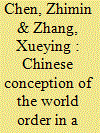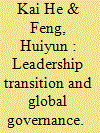|
|
|
Sort Order |
|
|
|
Items / Page
|
|
|
|
|
|
|
| Srl | Item |
| 1 |
ID:
172121


|
|
|
|
|
| Summary/Abstract |
The arrival of the Trump administration in the United States has sent shockwaves through the global system, triggering widespread rethinking of the current world order and its future direction. This happens at a time when China is starting to embrace a more proactive role in shaping the world order, based on its growing national strength and global influence. During the last seven decades, China has transformed itself from a ‘revolutionary order-challenger’ to a ‘reformist order-shaper’. In the post-Cold War hybrid world order, China has gradually developed its view regarding the positive components of the world order which should be maintained, the deficient aspects of the world order to be reformed, and a vision of shared future to be promoted. Facing the challenge of the Trump era, Chinese scholars are debating future scenarios for the world order and how China could position itself and contribute to a more resilient international system. Though worst-case scenarios are considered, cautious optimism is maintained.
|
|
|
|
|
|
|
|
|
|
|
|
|
|
|
|
| 2 |
ID:
190528


|
|
|
|
|
| Summary/Abstract |
This paper looks at issues of justifying and developing the concept of military-technical asymmetric response when deterring a prospective adversary from instigating military conflicts of varying intensity. It formulates basic provisions for devising asymmetric responses to confront high-tech prospective adversaries and irregular formations while developing asymmetric weapon systems.
|
|
|
|
|
|
|
|
|
|
|
|
|
|
|
|
| 3 |
ID:
167319


|
|
|
|
|
| Summary/Abstract |
The establishment of the Asian Infrastructure Investment Bank (AIIB) signified China’s ‘charm offensive’ towards multilateral institutions and existing global financial governance. If the rise of China is inevitable, what will the future world look like, and what should other countries be prepared for? Borrowing insights from institutional balancing theory and role theory in foreign policy analysis, this project introduces a ‘leadership transition’ framework to explain policy dynamics in global governance, with the AIIB as a case study. It suggests that China, the United States, and other countries have employed different types of institutional balancing strategies, i.e. inclusive institutional balancing, exclusive institutional balancing, and inter-institutional balancing, to compete for influence and interest in the process of establishing the AIIB. A state’s role identity as a ‘leader’, a ‘challenger’, or a ‘follower’ will shape its policy choices in global governance regarding different institutional balancing strategies in the process of ‘leadership transition.’ Institutional balancing is a new type of balancing among states in the future transformation of global governance. China’s institutional rise in global governance, therefore, might be more peaceful than widely predicted.
|
|
|
|
|
|
|
|
|
|
|
|
|
|
|
|
| 4 |
ID:
137645


|
|
|
|
|
| Summary/Abstract |
The literature on norm socialization and Europeanization has largely focused on successful norm diffusion, but thus far it has hardly addressed the norm backlash from the respective societies. To more fully grasp the interaction between member states’ roles and their institutional preferences we provide a conceptual model for the de-composition of national role conceptions. This model is applied in case studies on German and Czech European policies in the constitutionalization process of the European Union. The paper illustrates how the composition of Czech and German roles has changed over time and how these national role conceptions shape the countries’ respective institutional preferences. We conclude that historical role experience is considered as a powerful explanatory tool for the policies of today’s European Union member states.
|
|
|
|
|
|
|
|
|
|
|
|
|
|
|
|
|
|
|
|
|